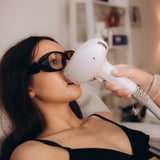
Fine lines, wrinkles, and sagging skin are all a normal part of life. But for those of us who want to avoid the signs of aging for as long as possible, there are options. Take plastic surgery, for example. Baby facelifts, one-stitch facelifts, and procedures like neck lifts are all viable options.
However, if you fall in the camp of wanting your skin to look and feel its best but you feel like you need more than topical products and you're still too weary of going under the knife, there are plenty of noninvasive options to check out, like Ultherapy. It's an FDA-approved procedure that lifts and tightens skin without the need for surgery.
Want to know more? Ahead, we chat with experts who break down everything to know about Ultherapy, like who is a good candidate for the treatment, what the side effects are, and how much it costs. Keep scrolling to learn more.
What Is Ultherapy?
"Ultherapy is a noninvasive cosmetic procedure that uses ultrasound technology to lift and tighten the skin on the face, neck, and décolletage," Evelyn Ramirez, a licensed aesthetician, tells PS.
At an Ultherapy appointment, an ultrasound gel is first applied to the location of treatment. From there, a handheld device is used to pass over the treatment area three times at different depths. "[It] uses ultrasound energy in a focused manner to target the skin and deeper tissues of the face to create injury that leads to collagen production and tightening of the tissues," says Nigar N. Ahmedli, MD, the director of the division of facial plastic and reconstructive surgery at Montefiore Einstein Advanced Care. Results can typically seen immediately after.
Whether or not you're a good candidate for the treatment depends on a number of different factors. "Ideal candidates are individuals with mild to moderate skin laxity who seek nonsurgical skin tightening and lifting," Ramirez says. "Many providers like to combine this treatment with other modalities, like lasers or microneedling, for overall optimal results, especially for candidates who fear more aggressive and invasive procedures."
Pricing depends on the provider and your location, but you can expect to pay anywhere from $2,500 to $5,000 for the treatment.
Ultherapy Benefits
In addition to lifting sagging skin and stimulating collagen production, one of the main benefits of Ultherapy is that there is minimal downtime because it's noninvasive. Plus, it typically only takes around 45 minutes to an hour to complete. "After the procedure, you can expect some prolonged heating and redness, which typically lasts no more than 24 hours," says plastic and reconstructive surgeon Jimmy C. Sung, MD, the medical director of Tribeca Aesthetics. You can return to your normal activities immediately after the treatment.
Plus, typically only one session is needed, and the results can last as long as a year.
However, there are some potential downsides. "Ultherapy is a highly technique-driven device," Dr. Sung says. "When energy is used excessively or applied to the wrong layer, nerve damage, fat loss, and burns can happen." Additionally, Dr. Ahmedli says that some patients will experience mild redness and swelling, as well as tingling. "Rarely, patients can develop a temporary numbness of the skin," she says.
After your appointment, it's important to avoid excessive sun exposure, keep hydrated, and use gentle skin-care products.
Prior to trying Ultherapy for yourself, consult with a licensed physician to decide whether or not the treatment is right for you.
Ultherapy Before and After
Renee Rodriguez is a staff writer and social producer for POPSUGAR. She writes across all verticals, but her main areas of expertise focus on fashion and beauty content with an emphasis on reviews and editor experiments. She also produces social content for POPSUGAR's TikTok and Instagram accounts.
